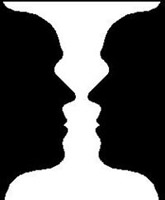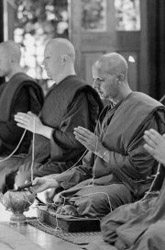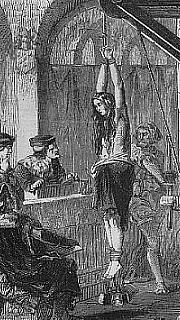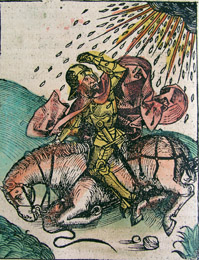World View
Worldview has a profound effect on the emergence of extraordinary ability. It opens some doors and closes others, telling us what is real and defining the realm of the possible. They affect the development of extraordinary abilities on several levels.
Perception
From the day we are born, our senses develop in interaction with the physical environment. During this interaction we learn to organize what we perceive in meaningful ways. When a collection of dapples and spots could be a predator hiding behind a bush, our ability to see meaningful patterns that show us the predator is important.
One anthropological study found that people raised in the forest were unable to perceive large animals seen across a savannah. They saw the animals but believed that they were insects. No amount of arguing convinced them that what they were seeing were actually huge animals. Having no experience with seeing over large distances, they were unable to understand that a large animal can look small a long way away. From their perspective, the very idea was a joke.

As you can see from the face/vase illusion on the left, perception radically determines how we understand our world. A shift in perception of the same data yields new information. We develop our perceptual frameworks over time in known, familiar settings and the great majority of time these frameworks work well. It is difficult for us to believe that there might be more or different information available if we had the eyes to see it.
Extraordinary experience entails a type of perceptual reorganization. If our cultural context denies the reality of extraordinary abilities, these perceptual abilities are not developed. When extraordinary abilities do occur, we are confused, lacking a way of interpreting the experience. Are we wrong if we see the vase instead of the faces?
Social Setting
Worldview acts through the social setting in a variety of ways: identity formation (Am I a healer/visionary or insane?), providing consequences for behavior (Am I respected or hospitalized?) and defining what you do with extraordinary abilities when they arise ( Do we use them, suppress them or deny them altogether?).
Traditions vary widely in how they define extraordinary ability and those who have them. In some cultures they are accepted and cultivated for the good of the community. This can be seen in shamanic cultures which use extraordinary abilities for healing, finding food, locating missing persons and predators. The shaman in this context is an important and valued member of the community.
 Attitudes may differ even within the same religion. The Hinayana Buddhists acknowledge the reality of extraordinary capacities but down play them because they are seen as an obstacle to spiritual progress. Among the Mahayana Buddhist, extraordinary abilities are cultivated and used among the most spiritually evolved. Abilities here are used for moving others spiritually or inspiring dedication to the rigorous path of spiritual development.
Attitudes may differ even within the same religion. The Hinayana Buddhists acknowledge the reality of extraordinary capacities but down play them because they are seen as an obstacle to spiritual progress. Among the Mahayana Buddhist, extraordinary abilities are cultivated and used among the most spiritually evolved. Abilities here are used for moving others spiritually or inspiring dedication to the rigorous path of spiritual development.
Finally, we have the case in which extraordinary ability is defined as evil. Christianity is most well known for this belief which began in the mid 1400s within the Catholic Church as part of an attempt to suppress the pagan religions of Europe. Pagan beliefs and ritual were defined as satanic and the witches that practiced them malevolent.

The fear of witches in those times is hard to under estimate. Laws against witchcraft were enacted. Women and men were commonly arrested on suspicion of witchcraft, tortured, and killed. Many 10s of thousands died during what would come to be called the “burning times.” The persecution of the innocent and the gifted continued for 250 years and the heritage of these times linger even today. Extraordinary ability was effectively suppressed until the early twentieth century when extraordinary ability began to reemerge in the Evangelical Christian community.
In the west, we have a different variation on this: disbelief. The world view of Scientific Materialism cannot account for extraordinary ability because it cannot be explained within the current theories of reality. Because they cannot be real, reports of them are relegated to the category of superstition, delusion or fraud. Evidence of extraordinary ability is not met with torture and death but with more subtle forms of invalidation such as ridicule and shunning. In certain circles (e.g. academic institutions) belief in the extraordinary can led to attenuation of career advancement or even job loss.
Worldviews define reality for us by providing a template or window for looking at the larger Reality. The type of template determines what we experience, all of which has a profound influence on extraordinary ability.

In the times after Christ’s death, Saul was traveling the road to Damacus when he was struck by a blinding light and had a vision that transformed his life from a Roman persecuting Christians to a Christian missionary. As a result of this profound experience, Saul renamed himself Paul, going on to become one of the most revered saints of the Christian New Testament.
Let us consider this experience within today’s context. Saul is driving down Rt. 250 when he has a blinding vision and pulls off the road overcome. A highway trooper pulls up, sees Saul having his vision and determines he’s unfit to drive. The medics are called. Saul is taken to a hospital and diagnosed with a transient psychotic episode. Saul, who has renamed himself Paul, goes on to start a church and a movement which many look on with incredulity and skepticism. The miracle of yester year is redefined as mental illness because we do not believe in divine intervention, celestial visions, or spiritual transformation. Paul’s experience cannot be anything other than illness or perhaps fraud.
Every world view holds some aspects of truth while closing the door to other kinds of truth. In the west, myth and illusion is dispelled through rigorous scientific study but often the baby is thrown out with the bath water (i.e., extraordinary ability cannot be explained by our current theories so it must exist).
Other worldviews let in the miraculous but they also let in the fraud. The age of Spiritualism in the 1800s was filled with mediums using elaborate devices to fake the presence of spirits. Sounds emanated from spirit cabinets. Spirits appeared draped in cheese cloth. The medium levitated in mechanized chairs and ecotoplasm erupted from his/her body. If a new paradigm encompassing both science and extraordinary ability is to be created, humility and steely discernment must become bed partners.